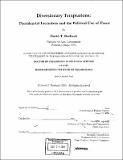Diversionary temptations : presidential incentives and the political use of force
Author(s)
Burbach, David T
DownloadFull printable version (37.74Mb)
Other Contributors
Massachusetts Institute of Technology. Dept. of Political Science.
Advisor
Harvey M. Sapolsky.
Terms of use
Metadata
Show full item recordAbstract
This dissertation assesses U.S. presidents' incentives for diversionary war. The political benefits of the use of force were measured and compared to the benefits of other dramatic foreign policy activities. Gains from force were modest, not unique, and discounted in many circumstances of political need. Statistical tests measured the changes in presidential approval ratings following uses of force, major diplomatic events, presidential speeches, and foreign travel by presidents, in the period 1953-2000. Historical sources and newspaper archives were used to identify and characterize uses of force and diplomatic events. Uses of force provide only modest and short-lived approval gains (average 6% increase with 3 month half life for major uses). Approval changes were greater with more media coverage, Congressional support, or popular goals (e.g., protecting American lives, not humanitarian intervention). Approval gains were higher during recessions, but losses occurred when prior approval was low for non-economic reasons (e.g., scandals). Diplomatic events produced slightly smaller benefits, conditioned by similar variables except for retaining their popularity during scandals. Foreign travel and speeches had little impact. The frequency of presidential activities changes in response to political variables, in ways that are consistent with maximization of political benefits. Uses of force became slightly more common during recessions, less common when approval was low for non-economic reasons. (cont.) Elections reduced the rate of all activities. These results may explain previous negative findings for U.S. diversionary war: presidential incentives for diversionary force are weak because potential gains are small, other tools are available, and they are discounted during times of need. Diversionary use of force would be attractive during economic slowdowns, however.
Description
Thesis (Ph. D.)--Massachusetts Institute of Technology, Dept. of Political Science, 2003. Includes bibliographical references (v. 2, leaves 407-420).
Date issued
2003Department
Massachusetts Institute of Technology. Department of Political SciencePublisher
Massachusetts Institute of Technology
Keywords
Political Science.